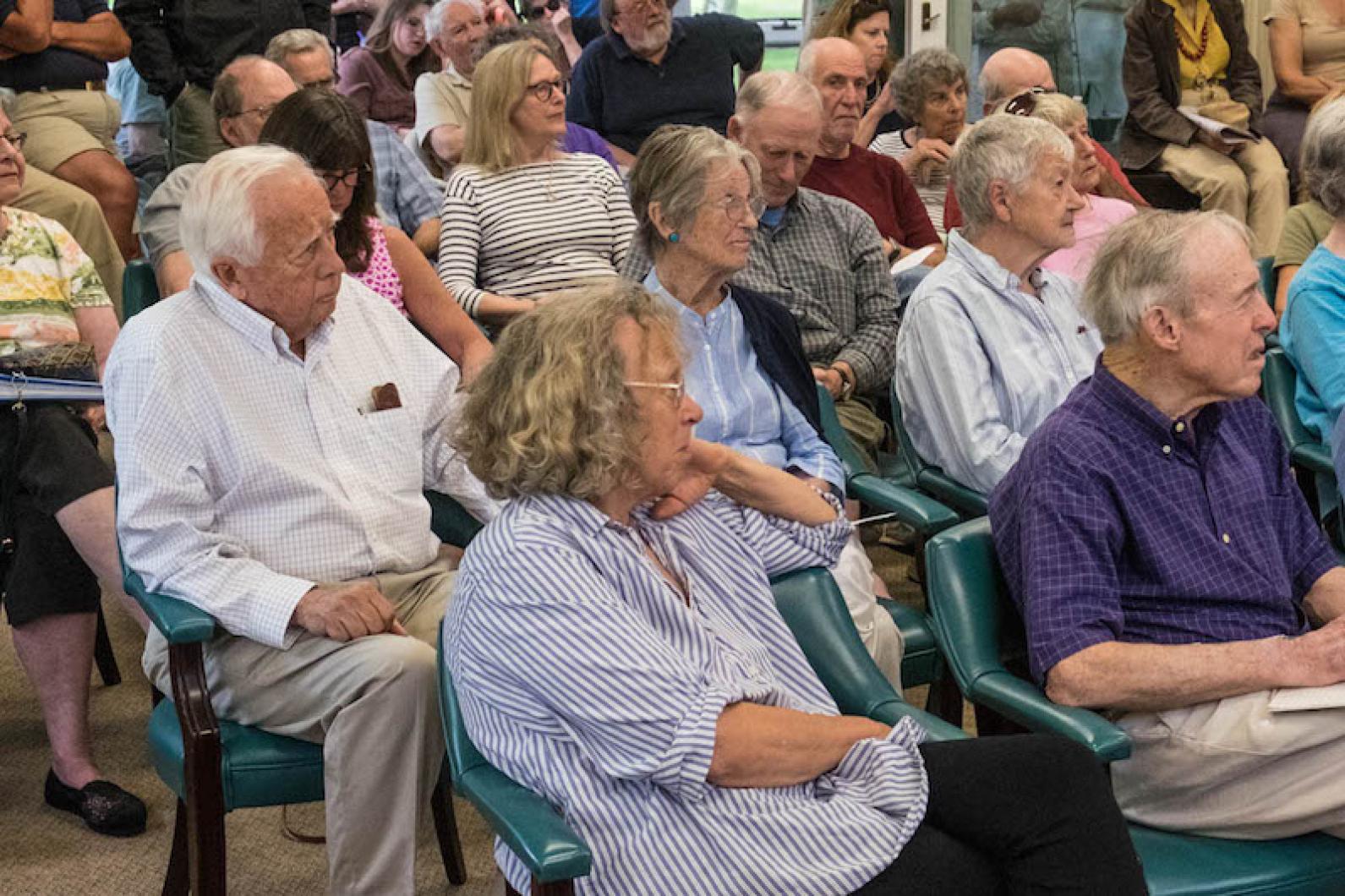Despite fierce opposition from the Island community, Martha’s Vineyard Film Festival leaders said this week they intend to follow through with plans to buy a tract of residential farmland in West Tisbury where they hope to build a permanent home.
In an email that went out to members last Thursday, the festival said it planned to buy 12.5 acres and a house at 694 Old County Road, property formerly belonging to the late Cynthia Walsh. A purchase and sale agreement has been signed to buy the property for $1.4 million. A closing is set for June 22, reportedly with no contingencies.
No plan has been presented yet for the property. And any plan to develop it would need to clear a gauntlet of required regulatory approvals, including from the Martha’s Vineyard Commission and an array of local boards.
“What made sense to us was to buy the property first and then have the conversations,” film festival founder and director Thomas Bena told the Gazette on Thursday. “There’s no question in our mind that it’s the right property for us.”
In late March, Mr. Bena attended a meeting of the West Tisbury planning board where he described a concept that includes a 6,000-square foot barn for film events, along with a commercial kitchen and a farming operation.
Mr. Bena said festival leaders are working to raise $2 million for the project, and that an eight-member board of directors voted unanimously on May 3 to buy the property. Steve Bernier, a well-known Island businessman and Chilmark resident, is chairman of the MVFF board.
Meanwhile, outrage simmered in the community and online this week, finally spilling out at a meeting of the town selectmen on Wednesday after a story on the Gazette website had attracted a flood of comments from readers. Following about an hour of discussion, board chairman Richard Knabel publicly called on the festival directors to reconsider their plans.
“The film festival is certainly entitled to pursue their proposal,” Mr. Knabel said. “However, it clearly already has become a very contentious and divisive issue, even before a more definitive plan has been presented. I fear the situation will only become more inflamed if the proposal is in fact pursued.”
No representatives from the film festival attended the meeting. But festival managing director Brian Ditchfield said Thursday that reconsidering the plans would be premature. “We haven’t even secured the land yet,” he said. “As we do that and as we begin any planning process, absolutely we plan to reach out to abutters and beyond.”
Mr. Bena said when he met with the planning board in March he understood that because the film festival is an educational nonprofit, it could be permitted in a residential area. Mr. Ditchfield was also confident the project could be permitted. “We’ve had legal advice, we’ve had advice from friends and board members, and we’ve seen that precedent here on the Island,” he said. “So we felt as if we should move forward.”
More than 50 people attended the selectmen’s meeting Wednesday, held at the Howes House, including the historian David McCullough and his wife Rosalee McCullough, longtime West Tisbury residents. Those who spoke out against the proposal included at least two people from other Island towns.
Mark Reisman of Old County Road criticized the approach. “The festival’s quick purchase of the property without any public notice and a contract that apparently has no contingency clause suggests an approach designed to intimidate residents and local governmental agencies,” he said.
Several people took aim at the festival’s mission as a nonprofit. Rez Williams, an artist who lives off the end of Old County Road, argued that a state law exempting some educational programs from land-use restrictions would not apply in this case. He noted that in its official mission statement, the festival describes its main purpose as “offering an enriched film program.”
“We seem to have a conflict here on the face of it,” Mr. Williams said of the proposal.
Chilmark Library director Ebba Hierta, who lives in West Tisbury, also criticized the festival for claiming to have a mostly educational purpose. “This is a minuscule fraction of their overall activities,” she said. “What they are proposing here is an entertainment-restaurant complex. What else is a facility with a commercial kitchen that intends to sell food to the public?” She called on the selectmen to take a lead in rejecting the proposal.
But Chilmark resident Chris Murphy pointed out that people have the right to buy property, and he urged those present to reserve judgment. “You all ought to turn around and take a look in the mirror,” he said. “If I wanted to do a project, would I want a lynch mob out there looking at me before I even get started?” He continued:
“We should all take a deep breath. Really take a look at what’s being proposed. And as far as I can see, not a lot is being proposed yet.”
Tony McClellan, who lives across from the Walsh house, took exception to being called part of a lynch mob. “We are residents . . . in the neighborhood who live there because we like the community,” he said. “And we see it being abused.” His comments drew applause.
Despite the outrage and frustration, the meeting never fell out of order and the mood was mostly upbeat.
Several people spoke of their fondness for the neighborhood. Cynthia Riggs, a novelist whose family has owned the Cleaveland House on Edgartown West Tisbury Road for generations, said she had originally opposed efforts to form a historic district, since residents already maintained their historic properties, but she later came around.
“Somebody pointed out to me that yes, you may keep up the tradition of the village and the rural character of the land, but what would happen if somebody sells a house . . . [with] an inappropriate plan for that property,” she said. “I hope that the mission of the district to keep us a rural community will continue to stand.”
Nancy Dole, a member of the historic district commission, said the commission’s power to condition a project at the Walsh property would be limited to the first 800 feet from the road. (The property is about 2,218 feet long and 295 feet wide at the road.) “The historic district commission is not going to be able to stop a 6,000-square-foot building in there — appropriate or not,” Ms. Dole said.
Later in the meeting, Mr. Knabel again emphasized that the plans have hardly taken shape and only recently entered public awareness. “This took a fairly long time for it to percolate,” he said, noting the March planning board meeting. “But now it certainly has.”
In asking the film festival to withdraw its plans, Mr. Knabel said he was speaking only for himself but he acknowledged a demand for clear leadership from town citizens.
“I call on Tom Bena, Steve Bernier and the film festival board, for the good of all concerned, to reconsider their proposal, and spare us all the needless and prolonged unpleasantness and expense it will more than likely cause if they choose to go forward,” Mr. Knabel said.
While they did not attend the meeting, festival leaders said later they saw the process more as an opportunity than a trial.
“We have a mission here to gather people and to spark discussion, debate and action,” Mr. Bena said. “And that’s how we want to go through this process.” He also anticipated a series of public forums this year, but only after the festival takes ownership of the land.
“There’s no question in our mind that this is the place,” he said.











Comments (105)
Pages
Comments
Comment policy »